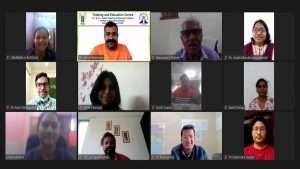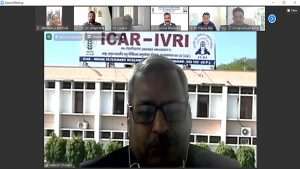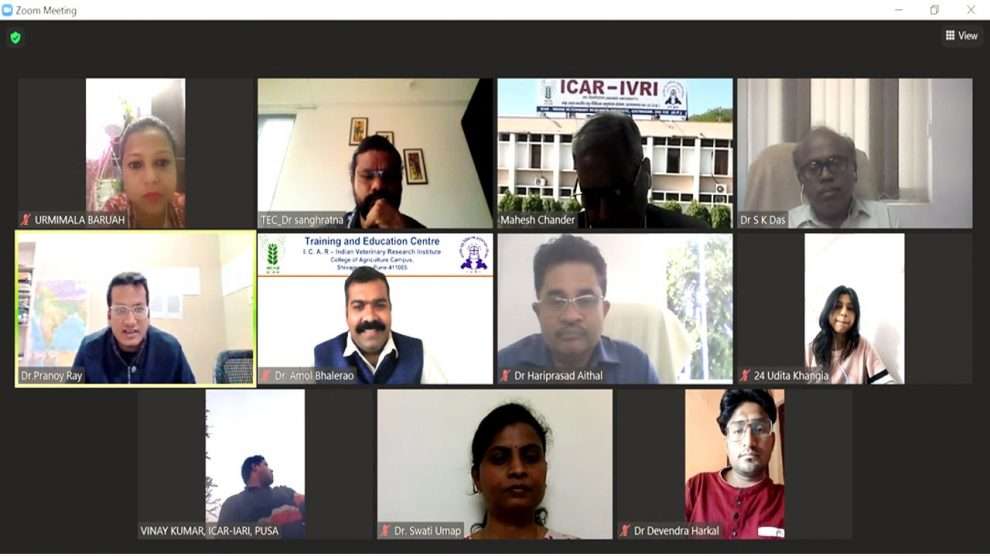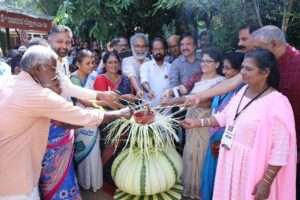A Training Programme on ‘Networking Skills’ was organized by Training and Education Centre, ICAR- Indian Veterinary Research Institute (ICAR-IVRI). Dr. Pranoy Ray, one of the trainees of the programme, share his key learnings from the training programme here.
CONTEXT
Anyone who has spent a significant amount of time in science and academia is bound to admit the importance of networking and how powerful it is as a tool for career development in science. We cannot have a reputation of being a successful scientist without doing good work, but it is also worth mentioning that we also cannot have reputation as a good scientist if no one knows of our work – this is where networking skills play a very important role. Keeping this in mind and considering the career needs of young researchers in the agricultural sector, the team at the Training and Education Centre, Indian Veterinary Research Institute, Pune, organized an online training workshop on ‘Networking Skills’ from 1 to 3 December 2021. It is a one of its kind, first paid soft skill training workshop of the centre, wherein 26 candidates participated. Trainees consisted of undergraduate students, master’s students, doctoral students, assistant professors, and early career researchers from different disciplines hailing from 15 states of India.
THE KEY LEARNINGS
The principal insights I have gained are given below:
Strategic sustainable networking
With everyone’s time and energy being limited, it is essential for us to be selective in our approach based on our career needs and the futuristic vision we have set. The training incorporates a participatory approach in the learning modules rather than being one way in nature. Participants were actively involved in setting their own career strategies and ways to maintain their own network, helping their connections and working towards their goals. A good strategy helps to find out the most effective way in which one can utilize one’s time and start networking which is a very wise investment. It is vital to visualize our network as an orchard, and see ourselves as gardeners who need to cultivate it in a sustainable manner, plant right connections in our network and establish good relationships with them. As the healthy body needs exercise, similarly a bright career needs networking. For an appropriate care and maintenance of this network, there is a need for regular follow up through digital medium, and only then should the interest to collaborate be expressed (Box 1).

| Box 1: Some examples of sustainable networking strategies SHIFTING TO INDUSTRY
GETTING FUNDING FOR PROJECTS
|
Conversational skills to network effectively
Networking is a sustainable investment and builds a good reputation over time. It means meeting and getting to know people whom you can assist and who can potentially help you in return. It is important to keep in mind that no one is going to network for us, therefore the onus is upon us to attend conferences, give talks, present posters, take part in discussions, and take advantage of the opportunities that we get to meet and talk to people. It takes a lot of courage to walk up to strangers and strike up a conversation when we’re not used to doing it, but for making contacts, this is exactly what we’ll have to do. It is essential to have effective mutual exchange of information, active listening by engaging full body in the process – comments of agreement, nodding, making proper eye contact, asking logical questions and above all, being honest in conversation and your authentic self. Although the training was held in an online mode, the methodology of the training ensured regular interaction among trainees. They were divided into small groups and made to interact in the breakout rooms and complete their assignments. This ensured the active participation of all the trainees and gave an opportunity to recognise and rectify their mistakes. Some of the golden rules in conversation for networking includes the following: do not interrupt, speak slowly, limit negative statements, avoid getting personal too quickly, and using the elevator pitch formula. The trainees were trained on different elevator pitch formula techniques for different types of situations and career needs, which is of great significance to them. The tone of voice, speed of delivery, and sentence construction are of great importance in conversational skills, if one is to effectively network. (Box 2).
| Box 2: Examples of re-orienting our approach while following up | |
|
|
|
|
|
|
|
|
Building a Network for a Career in Research/Academia
In order to build a network for a career in academia, there is a strong necessity to have a well-thought vision and a properly laid out career strategy. Acquiring skills in accordance to the goal-based strategy is essential and we need to break the our goals into smaller milestones. In addition to this, young career researchers need to get out of their comfort zone and try out various approaches, such as volunteering, which is a powerful tool for mutual success and creates trust and bonding. There is a sense of personal satisfaction as well as the reward of meeting like-minded people via volunteering. Starting a conversation with a stranger can build a network, and it will be of surprise to know how far showing a little bit of humanity can get you in the sciences. Other networking approaches in research include applying for scholarships and awards, writing for popular science periodicals and technical journals, public speaking, organizing and hosting, and community building. The honour of scholarships, awards and publications affirms the abilities of researchers, benefits their reputation and also improves their visibility in the network.
The trainees were trained on the practical techniques to approach professors for PhD/PDF positions, and to find out about various international fellowships and funding agencies. They were assigned tasks of crafting their own brand statement as a researcher and these were discussed in the training session so as to discern the scope for improvement, and address the shortcomings. Public speaking is also another important skill to enhance personal image in the network. It helps to overcome anxiety, fear and stress in young researchers. Organizing and hosting network events can help to acquire organizational skills, meet people, provide valuable services and promote themselves. Moreover, organising and hosting in multi-locations can help build communities. Professional organizations play a pivotal role in providing access to member directories, society awards, scholarships, professional development courses, short courses, and publicity via news sites, periodicals and social media accounts.
Digital and Online Networking
In this era of social media, there is a plethora of digital information, with digital and online networking playing a major role. Young researchers need to share the work they are doing, their accomplishments, meet new people, connect with them, and also maintain their existing contacts. In order to constantly maintain their network in the online medium, researchers need to generate useful content for others regularly and follow the trends. The various digital and online networking platforms include LinkedIn, Twitter, Researchgate, Github, Mendeley, Instagram, etc. Trainees were also trained on how to reorient their approach for writing e-mails and follow-up which seems a simple task but plays a crucial role in networking. It can either build or ruin our career. The modified phrases for composing email which can add value and create positive impacts in the minds of our network, were suggested along with sample emails for PhD/PDF positions. Some key strategies for opportunity hunting within the network were shared with tips for exploring relevant jobs and successfully winning project funding.
 Trainees learning certain key networking strategies through interactive discussions
Trainees learning certain key networking strategies through interactive discussions
UNIQUENESS OF THE TRAINING
- This type of soft skills training sessions is very unique because it incorporates interactive discussion techniques into group learning, thus encouraging learning from each other. It is much needed as it addresses the practical needs of trainees; moreover, it is starkly different from the mundane lectures on these topics and definitely, a welcome change.
- The participants were trained for not just networking approaches but also on how to deal with failures, overcome fears and anxiety, handle rejections – all of which are vital and remain unaddressed in academic circles.
- Effort was taken to put in variety of sessions, such as ice-breaking sessions, designing career paths based on trainee’s interests and skills, rapport building, tactics for creating connections, social media networking, and different energiser exercises by the coordinators. This was done to empower the trainees by helping them internalize these skills in their day-to-day life as they are highly sought after in this modern work world.
- The participants were divided into groups in breakout sessions at regular intervals so as to enhance their learning and promote interpersonal development, team building and confidence level.
- The training session incorporated a hands-on approach by persuading the trainees to open LinkedIn accounts, crafting their brand statement in the platform, developing their elevator pitch, demonstrating the flow of writing like email samples for PhD and PDF positions, addressing the doubts of trainees by practically showing the step-by-step process of networking strategies, and also how to reframe sentences for project proposals.
 Dr Mahesh Chander, the Chief Guest, interacting with the participants during the valedictory session.
Dr Mahesh Chander, the Chief Guest, interacting with the participants during the valedictory session.
IMPORTANCE OF NETWORKING SKILLS IN FUTURE AGRICULTURAL EXTENSION
- Extension professionals, in particular, need to use active listening skills for developing effective networking opportunities.
- It is important to invest in relationships and network to enhance the value for all and get maximum return. Building relationships and networks takes effort, commitment and time.
- It is necessary to enjoy helping each other as well as to acknowledge the help received in return, and celebrating each other’s success which is particularly applicable to those involved in extension.
- Don’t hesitate to reach out to people who will be useful in making more contacts; to learn what they are doing and offer assistance that builds and strengthens network, thereby making interactions mutually beneficial.
- Planning is important, but make sure to take actions that result in good outcomes for all.
- It becomes a privilege to work with like-minded peers, practitioners and experts in the field with shared values, if networks are established.
- Social media has an important role in establishing networks, and can be utilised effectively in agricultural extension activities by approaching potential connections and building upon it. However, at the same time, it needs to be used with caution and one needs to be professional while posting on social media.
CONCLUSION
The key outcome of the training programme was that it reoriented the approach taken by young researchers towards various much needed soft skills that can improve their chances at achieving their academic goals. These types of programs that provide soft skills training need to be held at regular intervals, as it is much needed in the present scenario. These sorts of learnings can boost career prospects where trainees explore and learn about various modern techniques, and also unlearn and re-learn some important skills. Successful academic professionals, after reaching high on their career ladder with good scientific achievements in their kitty, must help young researchers who are eager to meet them. They can help youngsters by reminding them of their early career networking days. As a young trainee in this dynamic training programme, I find it a much-needed career investment which provided proper and needed direction to my career. Such soft skills training programmes offered by Training and Education Centre, Indian Veterinary Research Institute, must be continued and popularised among young researchers so that a large number of them can benefit from it for a successful academic career.
ACKNOWLEDGEMENT
I warmly thank Dr. Amol Bhalerao, Scientist, Indian Council of Agricultural Research and Course Coordinator of the training programme for considering the career needs of the young generation of researchers in the agricultural sector, and consequently planning and successfully coordinating this training programme along with Dr. Sangharatna V. Bahire, Scientist, Indian Council of Agricultural Research. Additionally, my heartfelt gratitude to Dr. Amol for his constant encouragement and motivation, especially for writing this Meeting Note. Finally, I also genuinely thank and acknowledge the support of my young colleague Ms. Udita Khangia, undergraduate student from Assam Agricultural University, for sharing much-needed inputs and feedback about the training.
 Dr. Pranoy Ray, Department of Extension Education, Odisha University of Agriculture & Technology, Bhubaneswar, Odisha, India. (E-mail: pranoy-ee@pau.edu)
Dr. Pranoy Ray, Department of Extension Education, Odisha University of Agriculture & Technology, Bhubaneswar, Odisha, India. (E-mail: pranoy-ee@pau.edu)





Dear Dr. Pranoy Ray, Tank you for acknowledging our efforts and crisply writing meeting notes about our Networking Skills course. We, the team of TEC IVRI Pune are committed for the empowerment of young researchers. And your feedback is a motivation for us. Once again, thank you.
Best regards,
Dr Amol Bhalerao